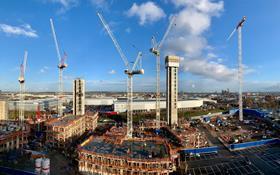New rules will lock out young overseas talent, warns chief executive

The RIBA has slated the government’s immigration white paper, saying the £30,000 salary test would be a disaster for the profession.
Banning anyone earning less than the threshold would lock out talented international architects at the start of their careers, said chief executive Alan Vallance.
He vowed the institute would do everything it could to make ministers “see sense” over the issue.
He also criticised the government for taking so long to issue the draft legislation, leaving practices and their staff in limbo for months.
The government has promised to consult on the £30,000 figure with opponents worried about the impact it will have on sectors such as construction and the NHS.
The figure was confirmed in the government’s 168-page Immigration White Paper, published yesterday, although ministers are expected to consult for another year on where to set the post-Brexit salary threshold for skilled immigrants.
Vallance said: “The movement of people is vital to the service sector, including architecture, and is the backbone of the UK economy. The long delay in publishing this White Paper has seen investment plans and projects put on hold and EU architects – one in four of the UK architecture workforce – left in limbo.”
He welcomed improvements to the rules regarding post-work study visas and removing the cap on the number of skilled worker visas.
But he said: “A £30,000 salary threshold would be a disaster for the architecture sector, locking out talented international architects at the start of their career. The RIBA will make that point forcefully in the consultation and we hope that the government will see sense.
“We need a new attitude to migration rather than just a rebranding. That needs to start with greater recognition from our politicians about the benefits that migration has bought the UK and the importance of non-UK talent to past, current and future economic growth.”
Concerns were also expressed by other parts of the construction industry. Brian Berry, chief executive of the FMB, questioned how sites up and down the country would be staffed.
Mark Robinson, Scape Group chief executive, said low-skilled trades like construction would have their pipeline of overseas workers cut off.
A cap on the number of skilled worker visas has been lifted but the government said it was sticking to advice given to it in a 140-page report published by the Migration Advisory Committee (MAC) – an independent body set up in 2007 – published in September which said unskilled workers should not be allowed into the UK just because a particular industry needed workers.
The White Paper said: “The MAC has said that there should be no dedicated route for unskilled labour and we do not intend to open one.
“This is consistent with the public’s view that we should be attracting the brightest and best to come to the UK and that lower skilled migrant labour may have depressed wages or stifled innovation in our economy.”
It added: “The government agrees with the MAC’s view that there should be no dedicated route for unskilled labour from any source… There will be no general use of schemes tailored to particular industries.”
The document also said employers “have to some extent become reliant on lower skilled workers from the EU for certain jobs. Leaving the EU provides an opportunity to drive business change and ensure that UK companies are at the forefront of innovation going forward.”
But it recognised “challenges” faced by sectors like construction and social care “who would find it difficult immediately to adapt” and so was proposing a transitional measure that would allow people to come for a maximum of 12 months. This will be followed, the White Paper added, by “a cooling-off period of a further 12 months to prevent people effectively working in the UK permanently”.
The new policy is due to be implemented at the end of the post-Brexit transition period, at the beginning of 2021.

The industry’s view
Alan Vallance, RIBA chief executive “A £30,000 salary threshold would be a disaster for the architecture sector, locking out talented international architects at the start of their career. We need a new attitude to migration rather than just a rebranding.”
Brian Berry, chief executive, FMB “From a migrant worker’s perspective, why go to the UK for just 12 months when they can settle in other countries for much longer and put down roots if they wish. The plans set out this week would make it impossible to meet the government’s house building targets and the world-class infrastructure projects we have in the pipeline will be nothing but a pipedream.”
Mark Robinson, Scape Group chief executive “The Government could ease the minds of the industry and classify construction workers as highly skilled. Construction trades require specific and detailed knowledge and it is a classification that is as arbitrary as it is unhelpful and could be hugely damaging to the UK.
“One thing is certain – we are teetering on yet another entirely avoidable cliff edge and we must change course before it is too late.”
















16 Readers' comments